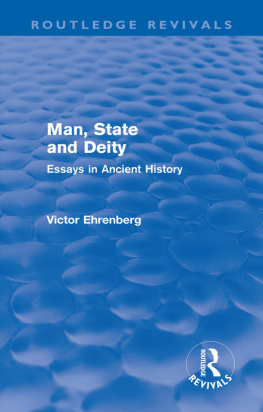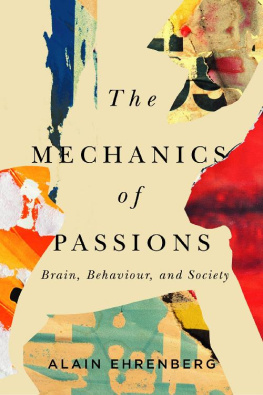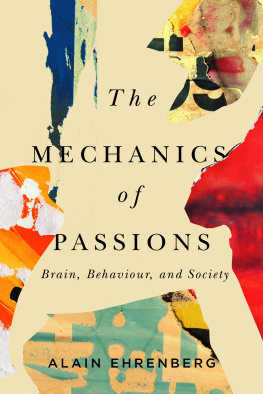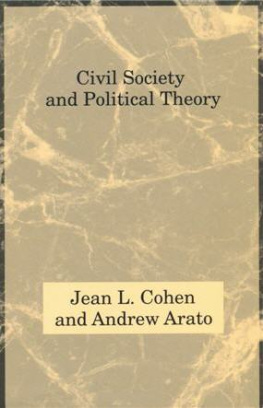Ehrenberg - Civil society: the critical history of an idea
Here you can read online Ehrenberg - Civil society: the critical history of an idea full text of the book (entire story) in english for free. Download pdf and epub, get meaning, cover and reviews about this ebook. City: New York, year: 1999, publisher: New York University Press, genre: Politics. Description of the work, (preface) as well as reviews are available. Best literature library LitArk.com created for fans of good reading and offers a wide selection of genres:
Romance novel
Science fiction
Adventure
Detective
Science
History
Home and family
Prose
Art
Politics
Computer
Non-fiction
Religion
Business
Children
Humor
Choose a favorite category and find really read worthwhile books. Enjoy immersion in the world of imagination, feel the emotions of the characters or learn something new for yourself, make an fascinating discovery.

Civil society: the critical history of an idea: summary, description and annotation
We offer to read an annotation, description, summary or preface (depends on what the author of the book "Civil society: the critical history of an idea" wrote himself). If you haven't found the necessary information about the book — write in the comments, we will try to find it.
Ehrenberg: author's other books
Who wrote Civil society: the critical history of an idea? Find out the surname, the name of the author of the book and a list of all author's works by series.
Civil society: the critical history of an idea — read online for free the complete book (whole text) full work
Below is the text of the book, divided by pages. System saving the place of the last page read, allows you to conveniently read the book "Civil society: the critical history of an idea" online for free, without having to search again every time where you left off. Put a bookmark, and you can go to the page where you finished reading at any time.
Font size:
Interval:
Bookmark:
Thank you for buying this ebook, published by NYU Press.
Sign up for our e-newsletters to receive information about forthcoming books, special discounts, and more!
Sign Up!
A publisher of original scholarship since its founding in 1916, New York University Press Produces more than 100 new books each year, with a backlist of 3,000 titles in print. Working across the humanities and social sciences, NYU Press has award-winning lists in sociology, law, cultural and American studies, religion, American history, anthropology, politics, criminology, media and communication, literary studies, and psychology.
No one involved in the current debates over civil societyand there can only be a few serious scholars who are notwill want to miss John Ehrenbergs trenchant and thrill packed (well, for us theorists anyway) biography of this amazing idea. A major contribution to the history of political theory by one of the brightest stars in the critical galaxy!
Bertoll Ollman, New York University and author of Dialectical Investigations
An absorbing study of a seminal idea in the history of political theory... This is a beautifully written work with an important critical perspective. It makes a genuine scholarly contribution.
Stephen Eric Bronner, Rutgers University
The Critical History of an Idea
John Ehrenberg

NEW YORK UNIVERSITY PRESS
New York and London
1999 by New York University
All rights reserved
Library of Congress Cataloging-in-Publication Data
Ehrenberg, John, 1944
Civil society : the critical history of an idea / John
Ehrenberg.
p. cm.
Includes bibliographical references and index.
ISBN 0-8147-2208-3 (cloth : alk. paper)
ISBN 0-8147-2207-5 (pbk. : alk. paper)
1. Civil societyHistory. I. Title.
JC336 .E35 1999
301'.09ddc21 98-40140
CIP
New York University Press books are printed on acid-free paper, and their binding materials are chosen for strength and durability.
Manufactured in the United States of America
10 9 8 7 6 5 4 3 2 1
This book would never have seen the light of day if my wife Kathleen hadnt urged me to write something relevant. This is often difficult for political theorists, but my students desire to navigate a complex world also provided early motivation and continuous support. I have also been helped by the interest, encouragement, and assistance of many friends and colleagues, among whom Stephen Bronner, Mark Naison, and Bertell Ollman deserve special mention. Finally, I want to thank Cecelia Cancellaro for getting me inand Eric Zinner and Niko Pfund for getting me out.
For three days toward the end of April 1997, the Presidents Summit for Americas Future focused national attention on a succession of speeches, workshops, and exhibits in Philadelphia. President Clinton gathered George Bush, Jimmy Carter, Nancy Reagan, Colin Powell, thirty governors, dozens of corporate executives, and Oprah Winfrey to urge Americans to volunteer for community service. The campaign, which General Powell is heading, seeks to mobilize volunteers and corporate money to help two million children by the year 2000, reported the New York Times. It hopes to compensate for a retreating federal governmentmuch of the retreating done under Mr. Bush and Mr. Clintonby providing children with mentors, safe places after school, health care, job skills and a chance to perform community service themselves. Articulating a central theme of his administration, the President called on volunteers to tutor children, paint schools, revitalize communities, and strengthen habits of good citizenship and public service.
The Philadelphia summits emphasis on local action and voluntary associations captured an important moment in a period marked by rapid economic change, sweeping attacks on the welfare state, and general withdrawal from political engagement. It articulated a distinctively American way of thinking about civil society, a notion that has figured prominently in academic and political discourse for most of the past decade. In the absence of noble public goals, admired leaders, or compelling issues, many observers have charted an alarming erosion of civic spirit and a corresponding decline in the quality of public life. An increasingly distressed literature has alerted the country to the damage done by cheapened standards of behavior, rude political speech, road rage, and offensive jokes. Experts worry that an overworked, disengaged, acquisitive, and self-absorbed population has allowed its moral connections, social engagements, and political participation to atrophy. Their concern is not limited to bad manners but has spilled over into political affairs and generated many suggestions about how public life could be improved in a period marked by fraying communities, widespread apathy, and unprecedented levels of contempt for politics. The American Political Science Association, for example, has organized a Civic Education Project for the Next Century to support research and stimulate teaching about civic trust, civic engagement, and civic education. In an effort to combat rampant cynicism and anger about public affairs, the project seeks to reinvigorate a particularly American orientation toward the civic work of ordinary people who, located in diverse, plural communities, work on behalf of their communities and seek eagerly for common goods, both heroic and mundane. Driven by an uneasy sense of decline and animated by a deep suspicion of the state, a growing body of contemporary work hopes that civil society can revitalize public life.
But the view that local voluntary activity sustains democracy is only one way of understanding civil society. Ironically, those who brought this notion to the center of contemporary political life conceptualized it in very different terms. In the early 1980s, a remarkably broad series of civic forums, independent trade unions, and social movements began to carve out areas of free political activity in the Eastern European countries of actual existing socialism. Their leaders talked of the rebellion of civil society against the state, and when they started coming to power in 1989 the stage was set for an explosion of interest that has been gathering force ever since. Liberal political theory was revived in demands for law-governed states that would protect private life and public activity from the intrusive hand of meddling bureaucracies. It was not surprising that Eastern Europeans should conceptualize civil society in terms of limiting state power, or that Americans should express it in the neo-Tocquevillean language of intermediate organization. If civil society meant constitutional republicanism in one area and local volunteerism supported by informal norms of solidarity and mutual aid in another, both bodies of thought sought to theorize it as a democratic sphere of public action that limits the thrust of state power.
As important as such formulations have been, the current literature leaves a great deal unsaid and unexplored. Seemingly new and hastily used concepts sometimes turn out to have revealing and instructive genealogies. Civil society is a very old idea and has long provided a fruitful vantage-point from which to evaluate the central categories of political thought. But many of the lessons that the past offers are obscured by the restricted political environment that conditions much contemporary work. Because its antecedents have not been adequately explored, civil society is often deployed in a thin, undertheorized, and confusing fashion. There is considerably more to this concept than meets the eye, and an explication of tradition can help us evaluate contemporary assumptions about its democratic potential.
Font size:
Interval:
Bookmark:
Similar books «Civil society: the critical history of an idea»
Look at similar books to Civil society: the critical history of an idea. We have selected literature similar in name and meaning in the hope of providing readers with more options to find new, interesting, not yet read works.
Discussion, reviews of the book Civil society: the critical history of an idea and just readers' own opinions. Leave your comments, write what you think about the work, its meaning or the main characters. Specify what exactly you liked and what you didn't like, and why you think so.




